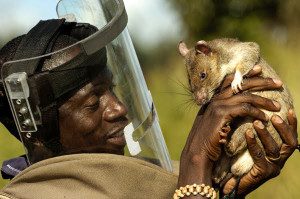
 One kind of waste that is particularly malicious is the waste of war, especially the booby-traps known as Anti-personnel mines. Tens of millions of these contraptions have been left behind in the past 50 years after the combatants cleared the field, mostly in developing countries in South-America, South-East Asia and Africa.
One kind of waste that is particularly malicious is the waste of war, especially the booby-traps known as Anti-personnel mines. Tens of millions of these contraptions have been left behind in the past 50 years after the combatants cleared the field, mostly in developing countries in South-America, South-East Asia and Africa.
Landmines are extremely durable and they are quite indifferent as to what will set them off, as long as it weighs more than 15 pounds. And so forty to fifty people are killed every day by these devices and countless more mutilated in the course of conflicts long settled; the total number of lives destroyed runs in the millions. About half of the victims are children, who think they found a toy.
Deactivating landmines is obviously a rather tricky business, but before they can be defused, they have to be found. This is quite difficult, because rarely if ever do the warring parties leave maps marking the spot. Moreover, the housing of many modern APMs is made of plastic to conceal them from metal detectors. Bomb-sniffing dogs do better, but are very expensive to train, often not resistant to local diseases and tend to weigh more than 15 pounds.
Rats, however, do not, not even the Giant African Pouched Rat, which grow to the size of a small cat. They are also easy to train, very adaptable to harsh conditions and have a sense of smell rivaling that of any dog. In the mid-Nineties, a young entrepreneur from Belgium with a lifelong love of rodents and appalled by the carnage in Africa, where he was doing research, connected the dots and started a company to train mine-detecting rats and their handlers.
In the two decades since its foundation, APOPO, an acronym from Dutch which stands for Anti-Personnel Landmines Detection Product Development, has cleared about 18 million square meters, that is 4,500 acres. Under ideal circumstances, it would take 50 human deminers to equal that and some of those would not make it through, while not a single Pouched Rat has perished in the line of duty.
The 8,000 mines removed by APOPO are just a drop in the bucket compared to the millions still biding their time out there, and the financial and bureaucratic hurdles to expand the program are formidable indeed, but as it is, it is a big step in the right direction. And somewhere in Africa there is a bunch of kids with their lives and limbs still intact because of Cricetomys Gambianus.

